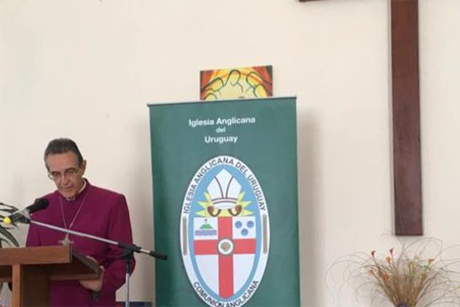
[ACNS, by Gavin Drake] The Bishop of Uruguay has delivered a critical presidential address to his diocesan synod, in which he said that parishes had failed to engage with “the basics” of mission and evangelism. Bishop Michele Pollesel used the example of a new priest who received complaints that he had used the same sermon three week’s running. “Yes, it´s true. I have preached the same sermon every week for three weeks now. I know what I’m doing. . . When you begin to live out this sermon, I will go to the next one.”
Bishop Michele was elected Bishop of the Iglesia Anglicana del Urguguay (the Anglican Church of Uruguay), part of the Anglican Province of South America, in 2011, in succession to Bishop Miguel Tamayo. He said: “without disparaging anyone in any way, I have begun to feel like that preacher. It may be that I am too impatient, or it may be that I still do not understand the Uruguayan context well, or it may be due to other reasons . . . however, it seems to me that not much of what I´ve exhorted the Church here in Uruguay to accomplish has been achieved.
“I have already said that this is the third year that I am repeating what the basics are for us and, frankly, I have not seen many results. Maybe I’m the only one who sees it this way. Perhaps some of you could name many changes you have experienced in your own community. If this is so, I am happy and I apologise for my insistence on this.”
He wants every parish to send its priest and two lay people to two training events that he is organising for 2017. “People will be coached, taught, and trained in the some of the basics: how to lead a service within their community; how to lead a Bible study; how to share a simple explanation of what Anglican faith and practice are about,” Bishop Michele said. “If any community is not represented at these sessions, either by laity as by clergy, as Bishop I will need to consider whether that community deserves to continue existing.”
He continued: “Why so severe? Because, from my point of view as the bishop in this diocese, we need to start walking towards the fulfilment of a simple but at the same time clear vision. We are not going to change the world, but we are going to begin to change our own perspective and perhaps also seek our own conversion.”
And he called on the diocese to strengthen its relationship with other churches in the Anglican Province of South America, saying that the relationship between the diocese and province was non-existent when he arrived. “There was a sense that we existed independently, that we had nothing, or very little to do with the Province, that the Province did not support us, and that we ourselves did not want to have anything to do with the Province,” he said.
“The Province was regarded as an enemy instead of seeing it as a group of other believers, other followers of Jesus Christ, trying to live out their faith in an appropriate way and according to their criteria.
“I remind you that the Church does not exist independently, but that all, no matter in what shape and / or manner we try to express our faith, we are all interdependent. We may have something different, something that we can share with others, but they also have something to share with us, and so we continue building God’s dream of God for all of us.”
In his address, Bishop Michele explained the difference between mission and vision. He said that the Church’s mission was based on the three pillars of proclamation of the Gospel, evangelism and church planting; training in the Gospel, discipleship; and service in the gospel, social outreach.
“The mission never changes,” he said, “it is always the same. However, the vision changes according to the circumstances and realities.
“The mission answers the question: What are we going to do? The vision answers the question: How are we going to do it?”
He said that the church in Uruguay had “not been very successful” and that proclamation was the weakest part of its mission.
In addition to creation of training events for parishes in the diocese, Bishop Michele has invited the Diocese of Chile to send two or three missionaries to help plant new communities in Uruguay.
“We need to experience different ways of being and acting as a Church in our country, and I hope they can help us to do this,” he said.
Adapted from The Anglican Communion News Service

